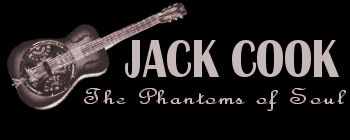 |
|
|
WEST COAST BLUES on 78 rpm In the 1940's independent record companies began to appear
in California and so did a certain brand of Rhythm & Blues. West
Coast Bands shuffled and swung to a beat that echoed the homelands
of Texas, Missouri and most of the other States. Singers crooned,
shouted and moaned. The electric guitar challenged the tenor sax
as a lead soloist. BeBop had arrived and would leave its mark on
every style of music that had a pulse. Although Los Angeles was
the center for many of these labels, the Bay Area also produced
a steady flow of releases.
|
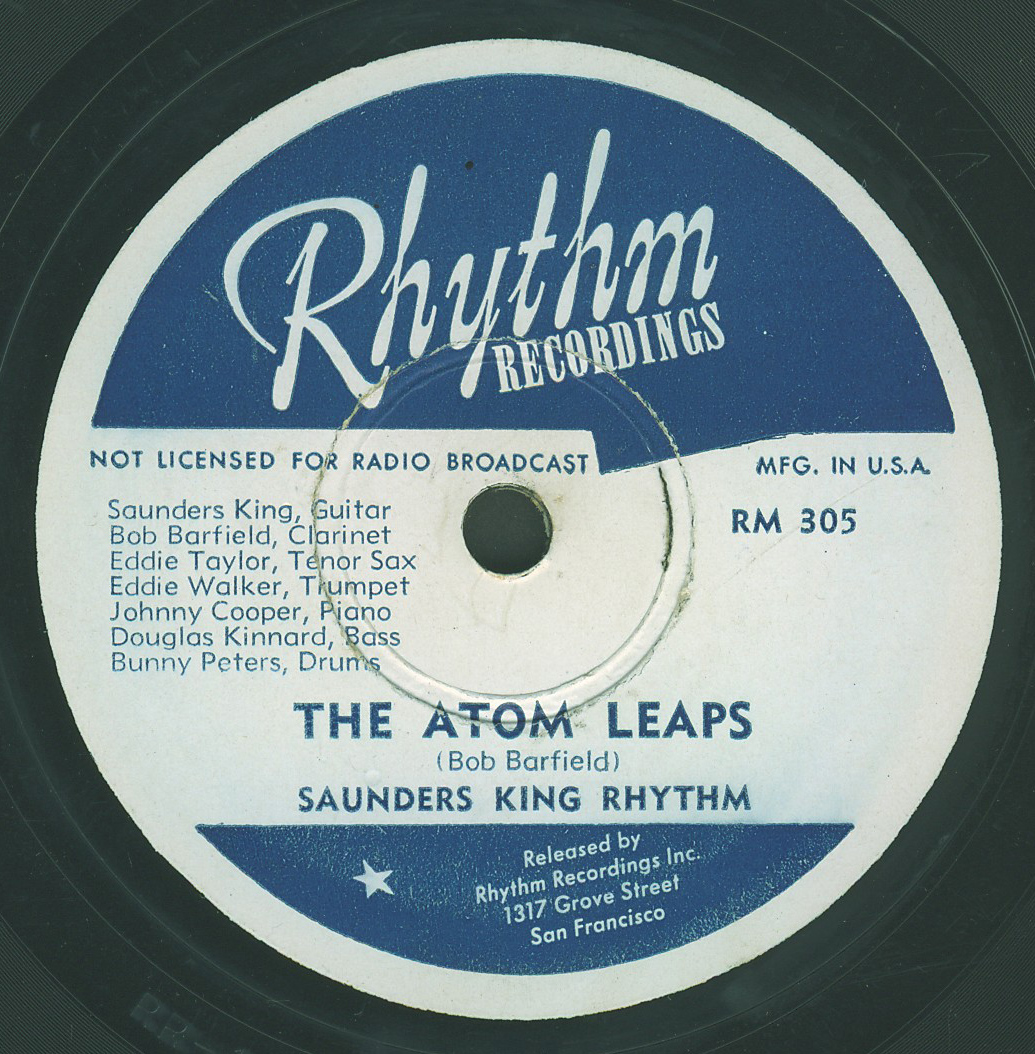 click here to listen |
Saunders King started recording for Rhythm Records in 1942. His recording of S. K. Blues was a hit for the label
and was covered by other artists. King was a smooth vocalist and a pioneer of the electric guitar.
The Atom Leaps was recorded in San Francisco, 1947. The tune was written by clarinetist Bob Barfield.
|
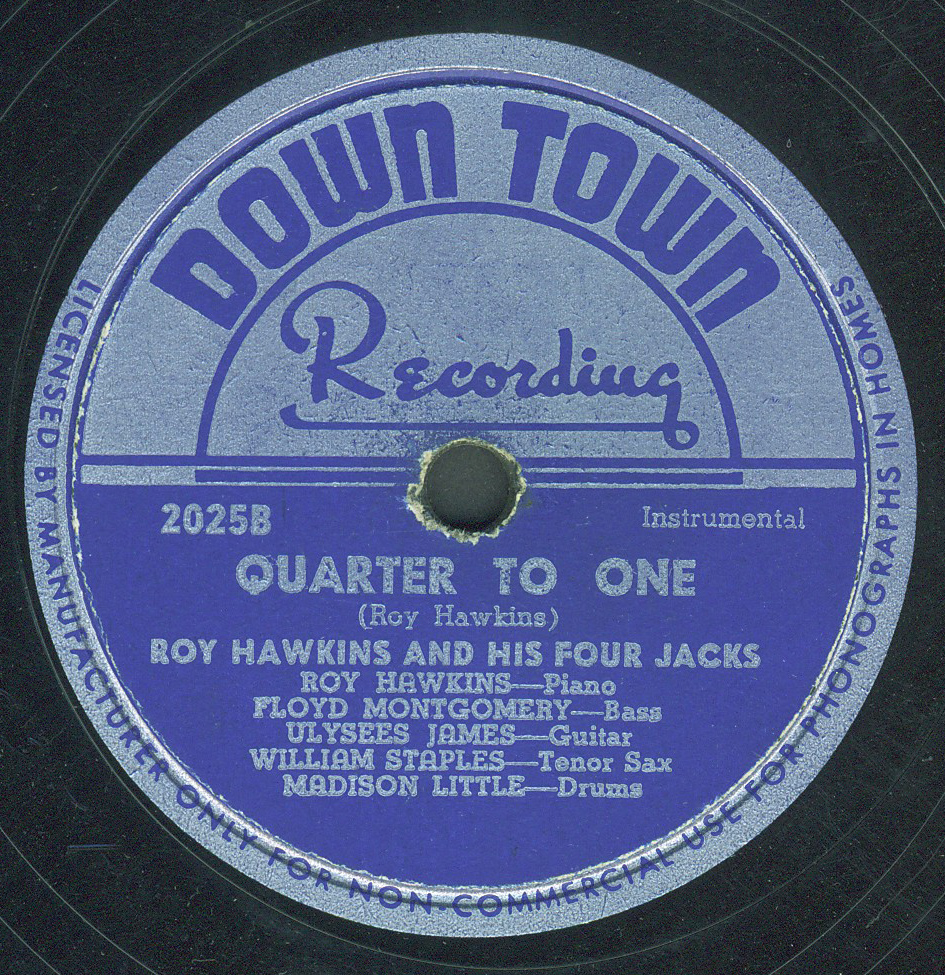 click here to listen |
Roy Hawkins and his Four Jacks were a rockin' band from Oakland. Hawkins' 1948 recording of Strange Land was a minor hit for Bob Geddins' Down Town label.
Another composition by Roy Hawkins titled The Thrill Is Gone would later be a big hit for B. B. King.
|
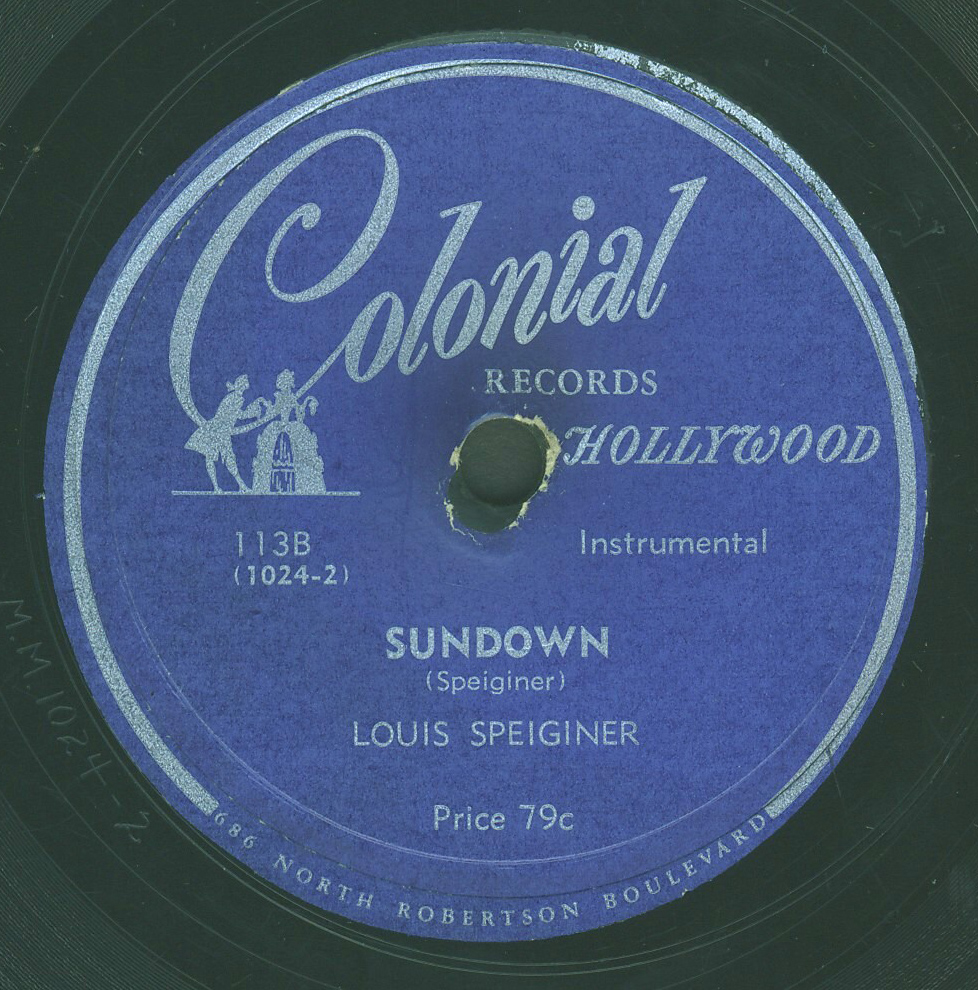 click here to listen |
Louis Speiginer played guitar on recording sessions with Jimmy Witherspoon and Jay McShann for the Supreme label in Los Angeles, 1947.
An instrumental titled Louis' Guitar Blues was issued as one side of Supreme 1501.
Sundown was recorded in 1949 and issued on Modern Records subsidiary label Colonial.
|
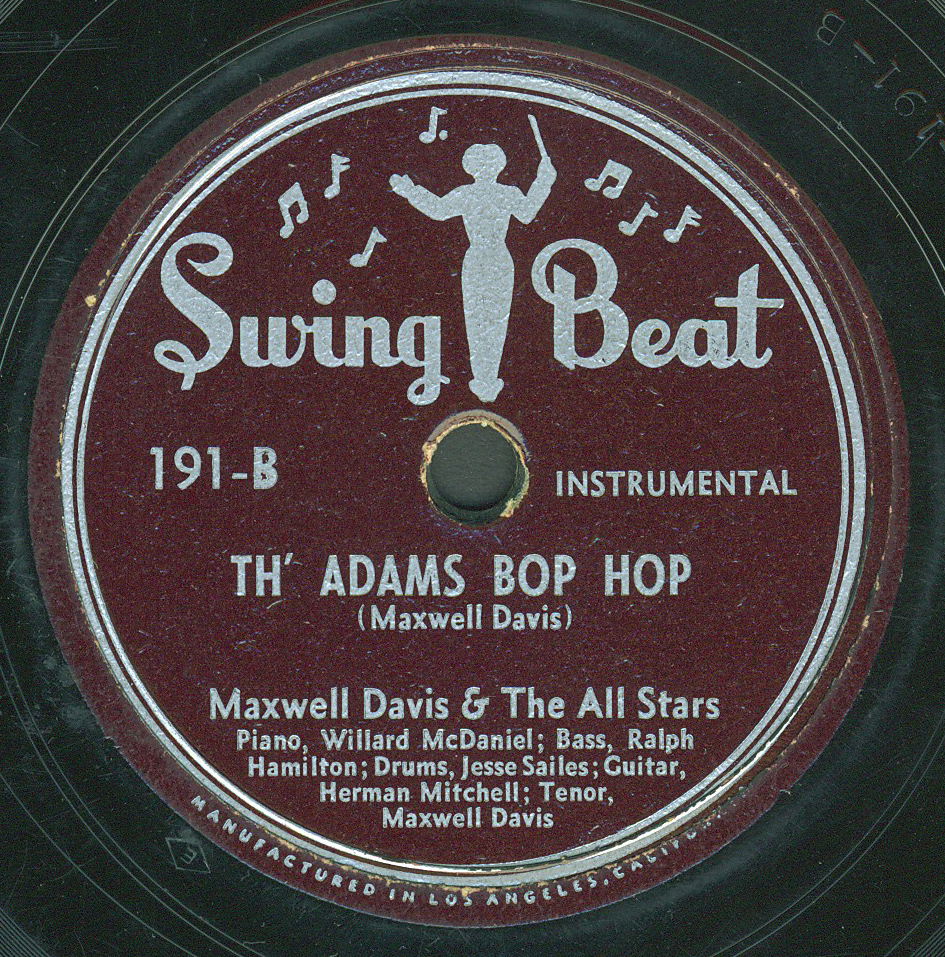 click here to listen |
Maxwell Davis was an important figure of the 1940's and 1950's Los Angeles Rhythm & Blues scene.
Davis backed up many R & B vocalists and also made recordings under his own name. Th' Adams Bop Hop was
recorded for Swing Beat in 1949.
This session also features Willard McDaniel on piano and Herman Mitchell on guitar.
|
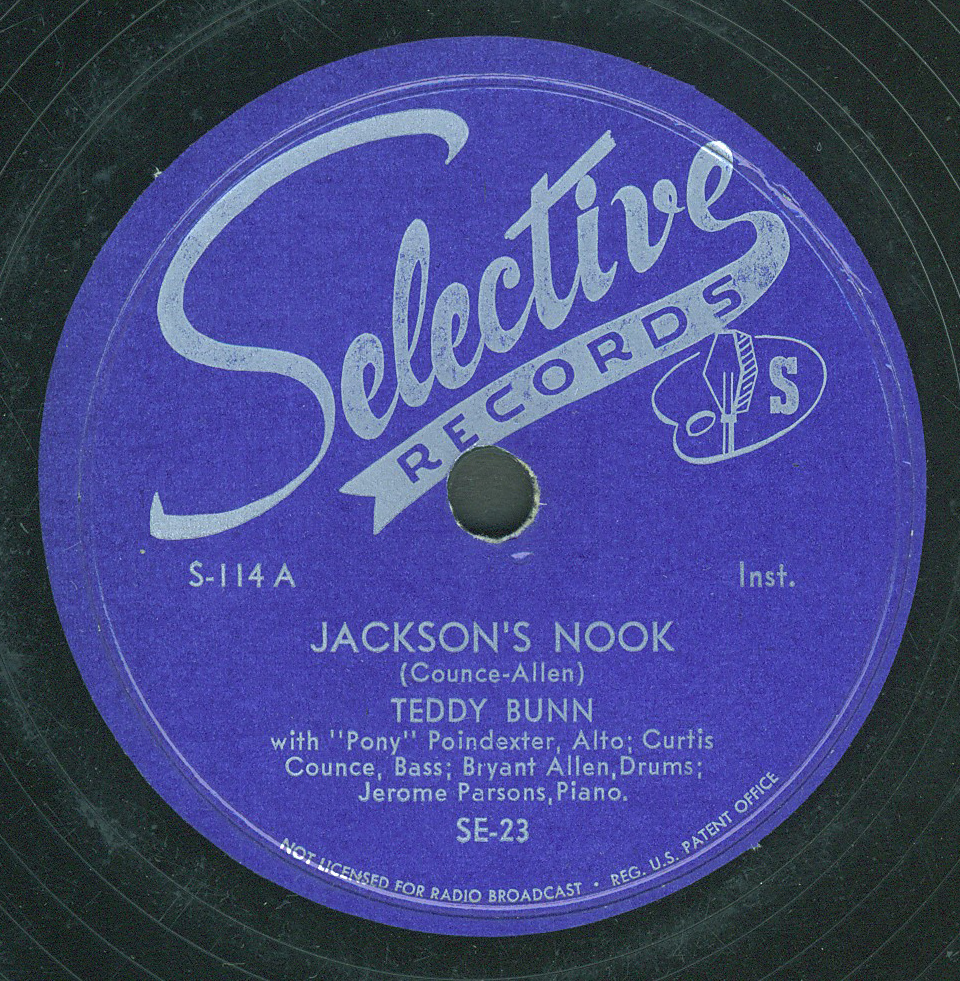 click here to listen |
Teddy Bunn began his recording career with Spencer Williams in New York, 1930. Bunn played guitar on a variety of blues sessions for Decca Records in the 1930's. In 1940 he recorded four solo performances for Blue Note. His electric guitar style is heard on sessions with Edgar Hayes for Exclusive in Los Angeles, 1948. Jackson's Nook is from a 1949 session for Selective.
|
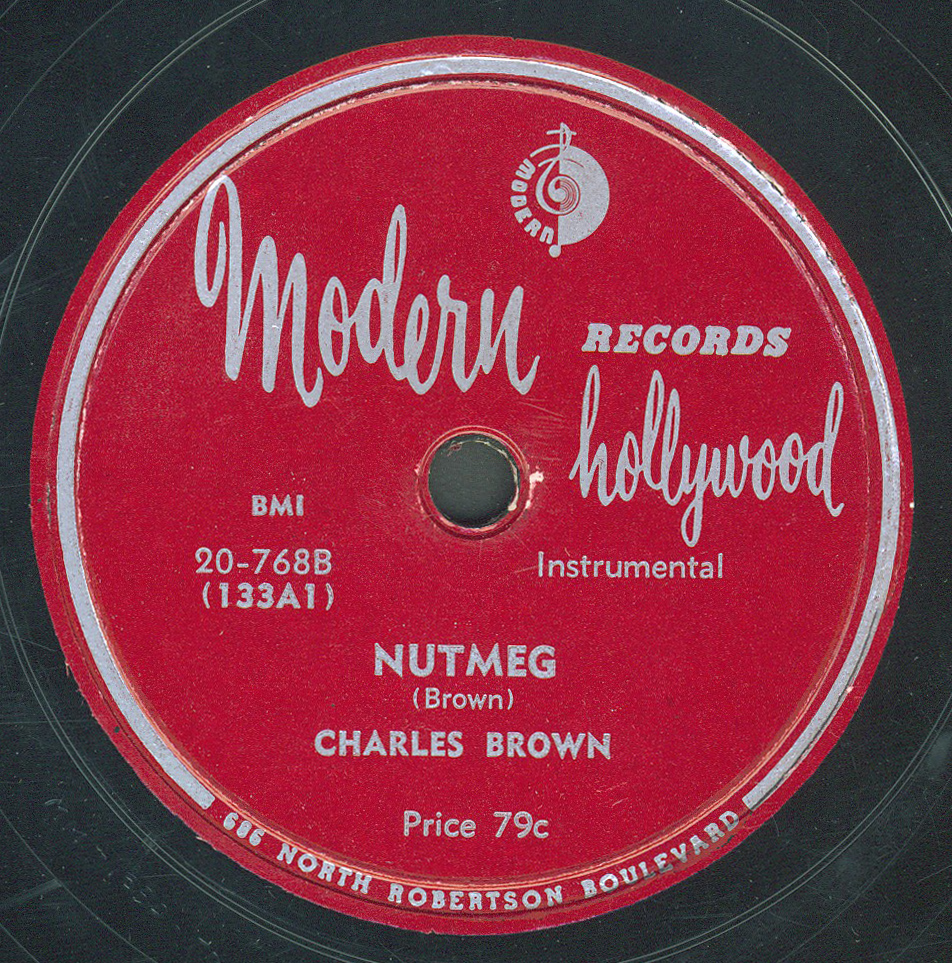 click here to listen |
Johnny Moore influenced most every blues guitarist that followed his path just as his brother Oscar did in jazz. Moore's Three Blazers included bassist Eddie Williams and the suave Charles Brown on piano and vocals. The instrumental Nutmeg was recorded at the end of a Three Blazers' session for Modern Records in Los Angeles, 1946. It was not released until later in 1950 under Charles Brown's name.
|
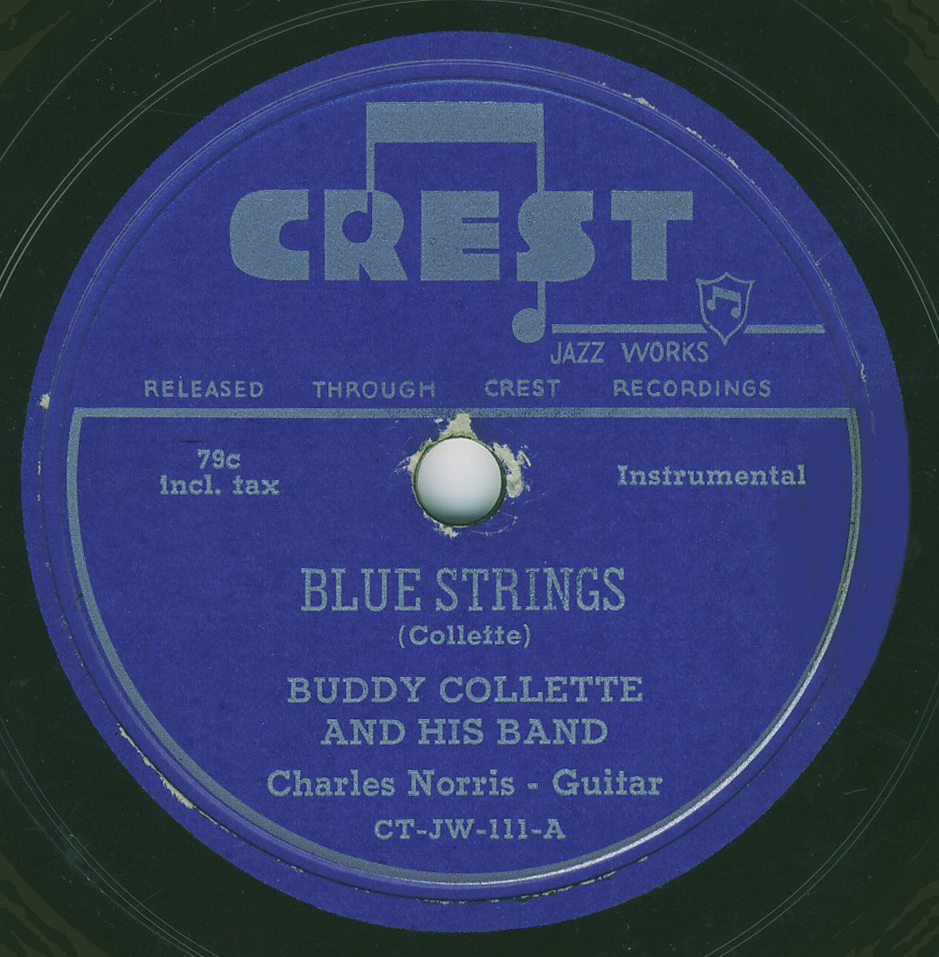 click here to listen |
Charles Norris was the featured guitarist on Will Roland's Shuffle Boogie recorded in Los Angeles, 1946 for Modern Records.
Norris continued to record under his own name and behind other singers,
sometimes under the band leadership of Maxwell Davis. Blue Strings was recorded with Buddy Collette
for Crest Records in Los Angeles, early 1950's
|
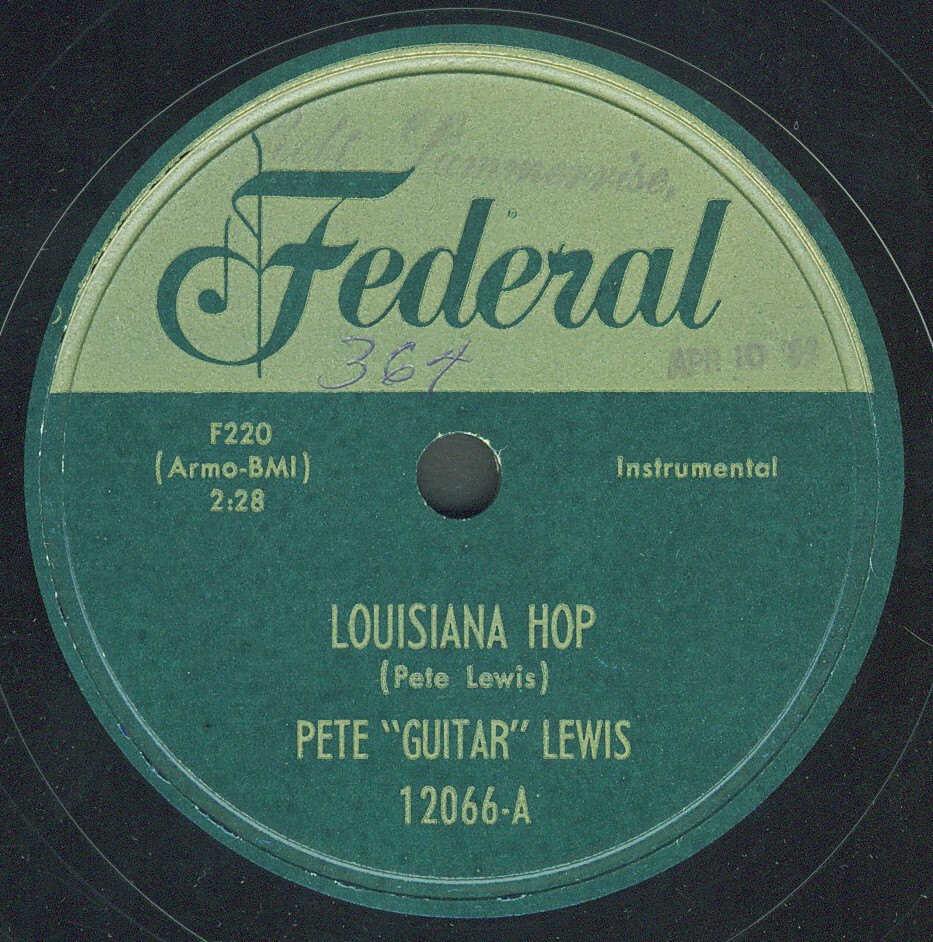 click here to listen |
Pete "Guitar" Lewis was a featured soloist with the Johnny Otis Orchestra. He recorded a slow instrumental with the orchestra titled Midnight at the Barrelhouse in 1947 for the Exclusive label. Both his guitar tone and attack were very dirty. In 1950 Cincinnati's King Records launched a subsidiary label called Federal. Beginning in 1952, R & B sessions recorded in Los Angeles joined the Ohio releases. Louisiana Hop is from a 1952 L. A. session.
|
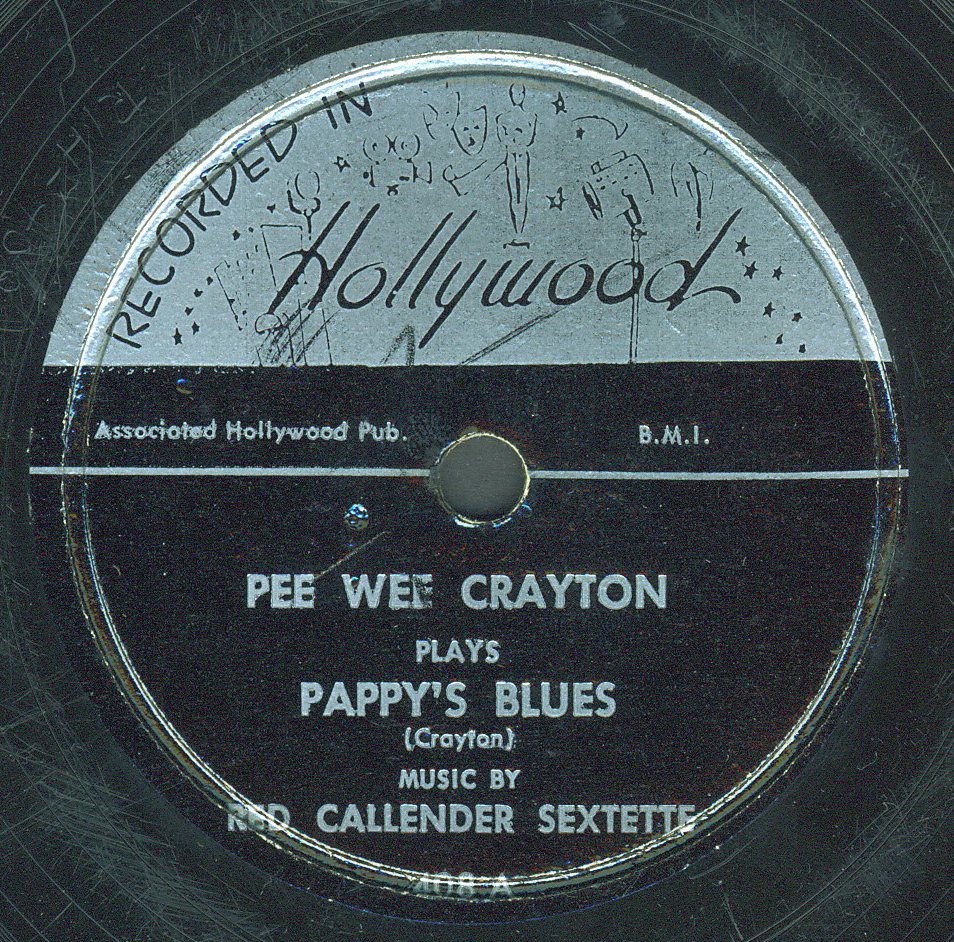 click here to listen |
Pee Wee Crayton made his recording debut in San Francisco for Laurent Records, 1945. According to Crayton at the time of the session he only knew two songs. Those two songs were strong enough performances to be re-released on the Recorded in Hollywood and Four Star labels. He continued to record for various labels including Modern, Imperial and Vee Jay. Pappy's Blues is a 1953 Recorded in Hollywood release. Pee Wee is backed up by the Red Callender Sextette.
|
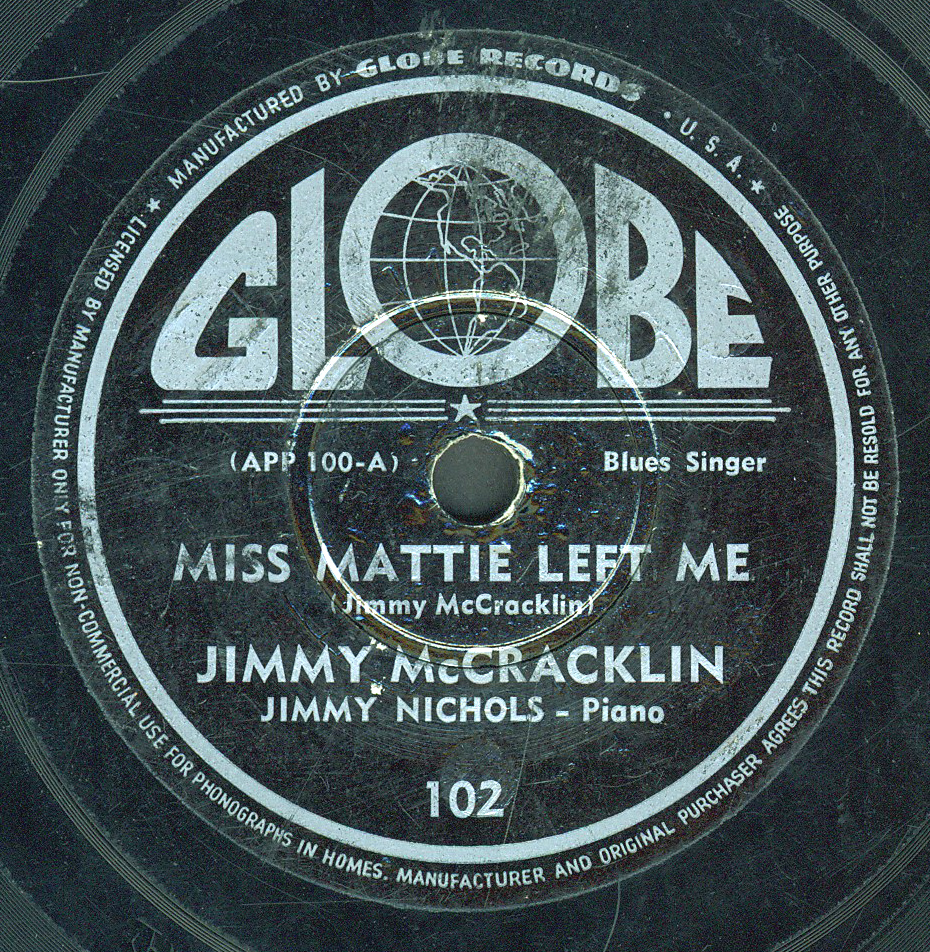 click here to listen |
Jimmy McCracklin was one of the main headliners of the Bay Area blues scene for decades. In the later 1940's and into the 1960's he made recordings on a variety of labels. Miss Mattie Left Me is from McCracklin's first session for Globe Records in Los Angeles, 1945. J. D. Nicholson plays piano under the name Jimmy Nichols.
|
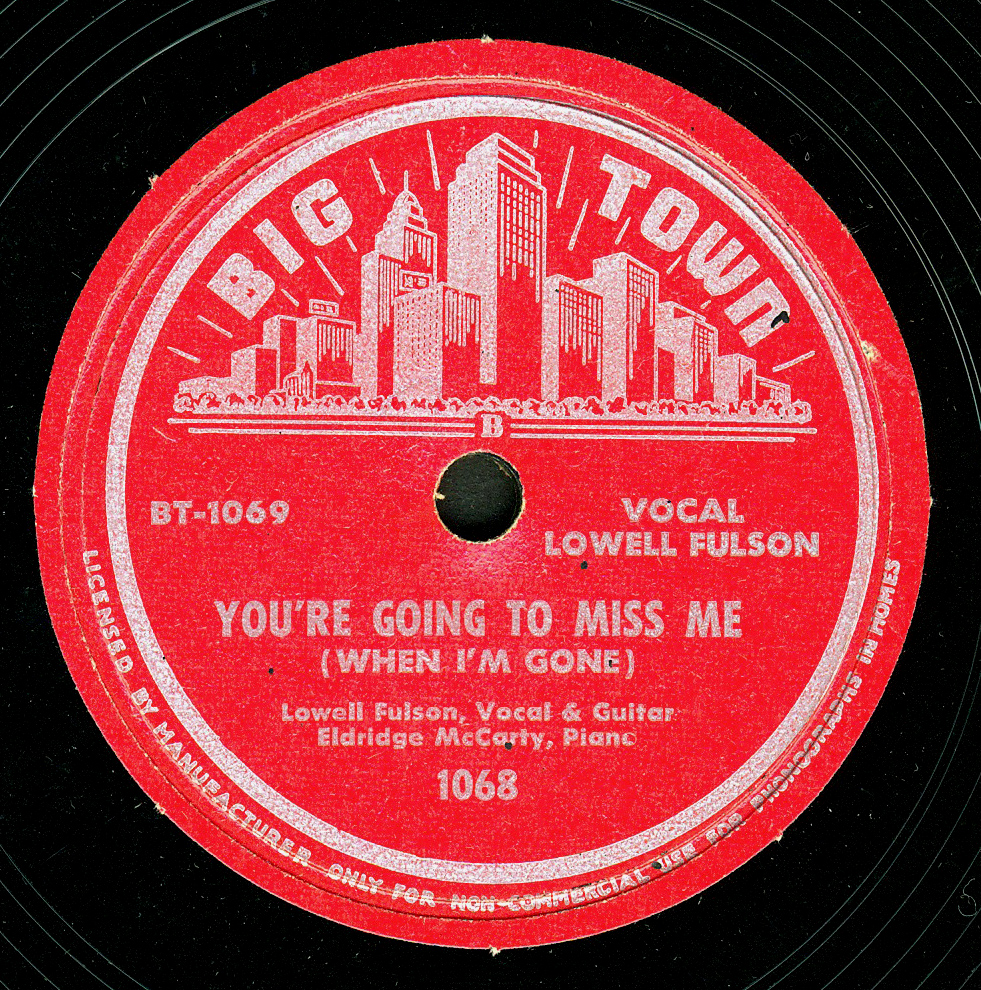 click here to listen |
Lowell Fulson made his first recordings for Bob Geddins in 1946. He continued to record, sometimes with his brother Martin on second guitar but more often with different rhythm sections. Lowell's guitar style was raw and his vocals robust. You're Going To Miss Me is from his first session for Big Town in Oakland, 1946.
|
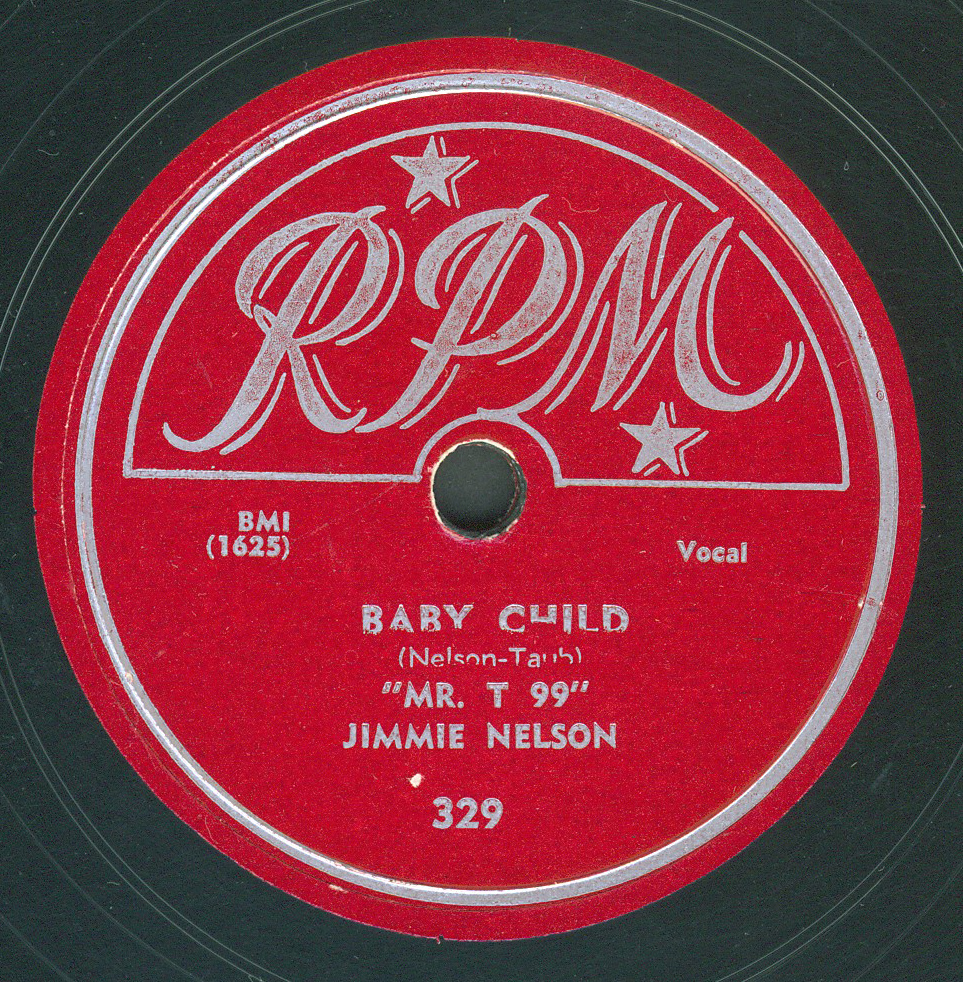 click here to listen |
Jimmy Nelson was a blues shouter in the tradition of Big Joe Turner. Jimmy started his recording career in Oakland, 1948 for the Olliet label. In 1951 he had a hit with T-99 Blues for RPM records in Los Angeles. This song gave Jimmy his nickname, to be used on future recordings. Baby Child is from a live performance in Oakland, 1949.
|
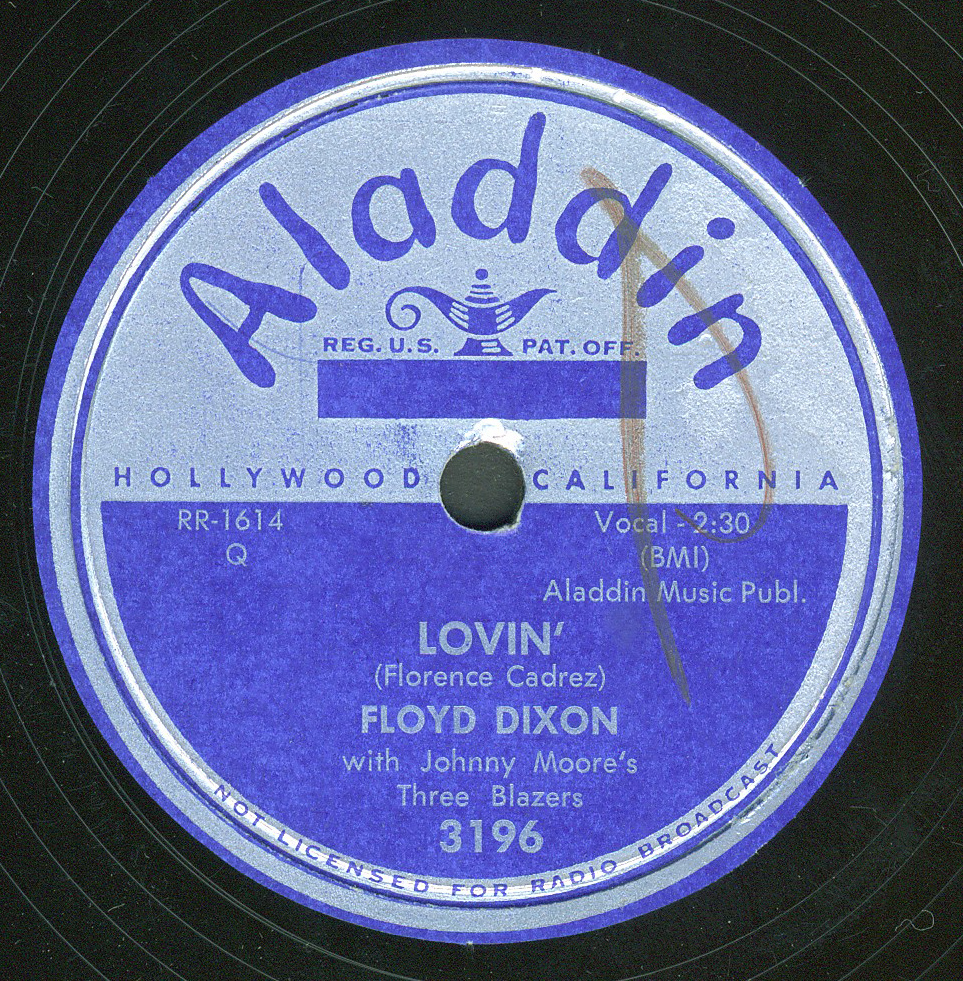 click here to listen |
Floyd Dixon was one of a handful of blues piano players that followed in the footsteps of the popular blues style of Charles Brown. Both Floyd's playing and singing had a little more of an edge than his rivals which gave him a distinct sound. His recording career started with Modern in 1948 and continued with Supreme and Peacock in 1949. Lovin' was recorded for Aladdin Records in Los Angeles, 1950. It features the guitars of both Johnny and Oscar Moore.
|
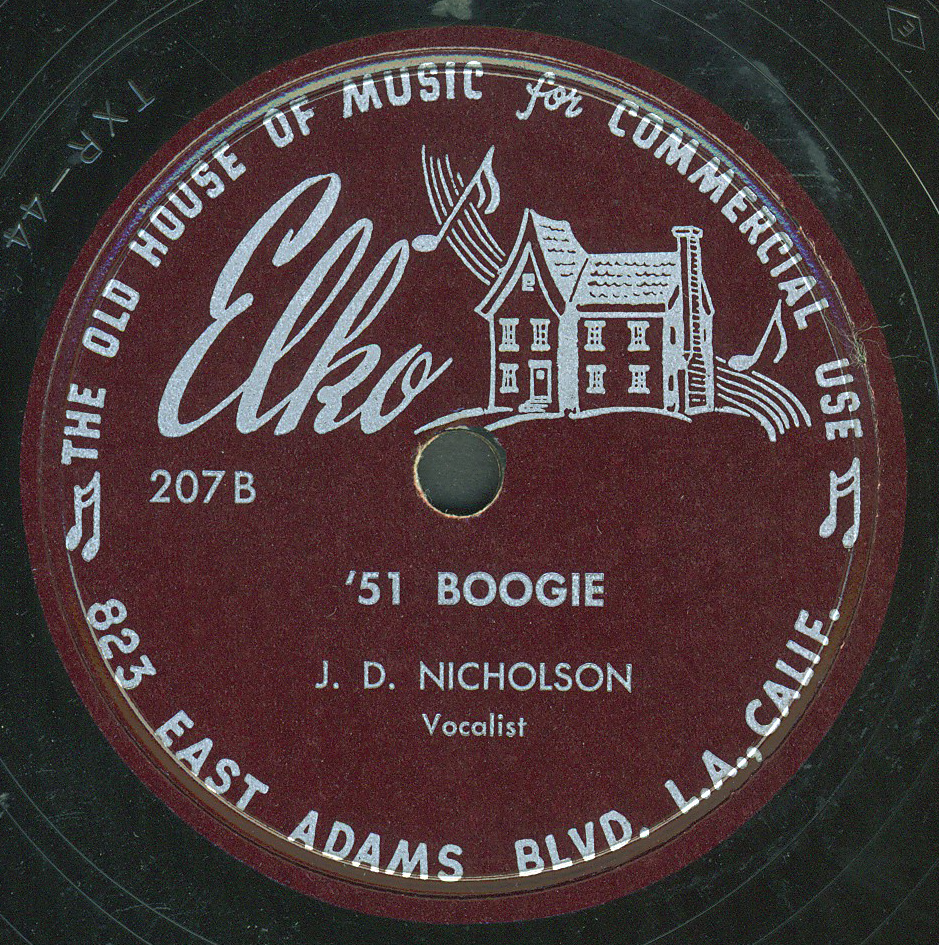 click here to listen | J. D. Nicholson played piano on Jimmy McCracklin's Globe recordings from 1945. Both his playing and McCracklin's vocals on these early sides show the influence of Walter Davis and other St. Louis blues stylists. J. D. made his first band recordings for Courtney in Los Angeles, 1948. '51 Boogie is from a session for J. M Fullbright's Elko label.
|
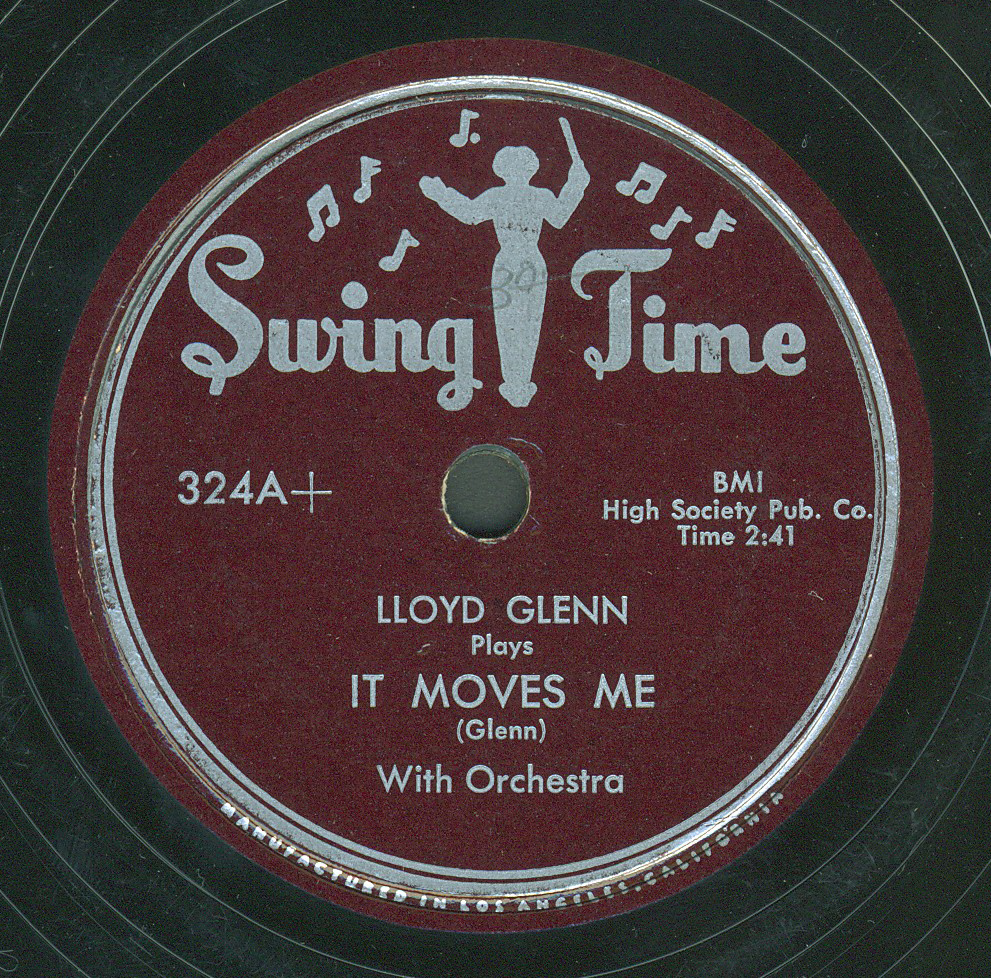 click here to listen |
Lloyd Glenn was an accomplished pianist and bandleader. Lloyd made recordings under his own name for Imperial in Los Angeles, 1947 and continued to record for various labels into the 60's. It Moves Me was recorded for Swing Time in 1952. The session includes long time band mate Billy Hadnott on bass and Mitchell "Tiny" Webb on guitar.
|
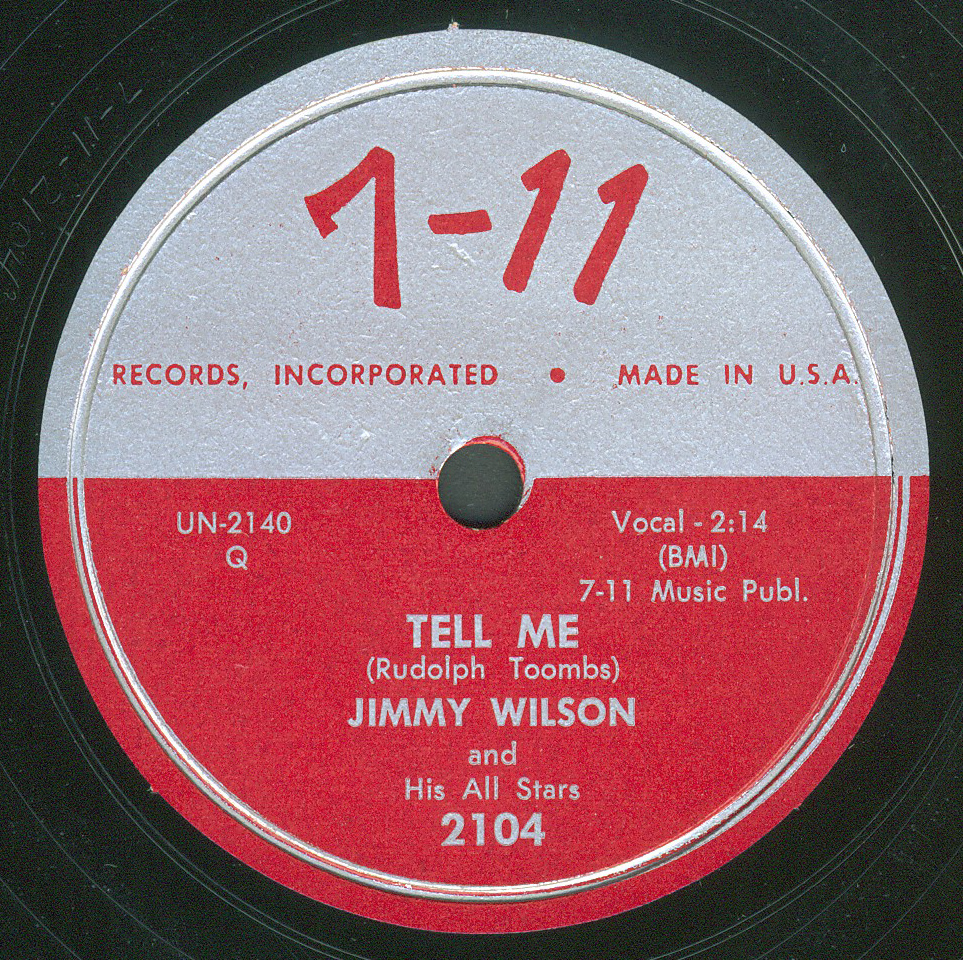 click here to listen | Jimmy Wilson sang on a number of releases for Bob Geddins labels starting in 1948 up into the 60's. Wilson's recording of Tin Pan Alley for Big Town was a hit and his rendition of the song became a blues standard. Tell Me was recorded in Los Angeles, 1953 for Aladdin records and released on its subsidiary label 7-11. The guitarist is listed in Blues Records as Lafayette Thomas.
|
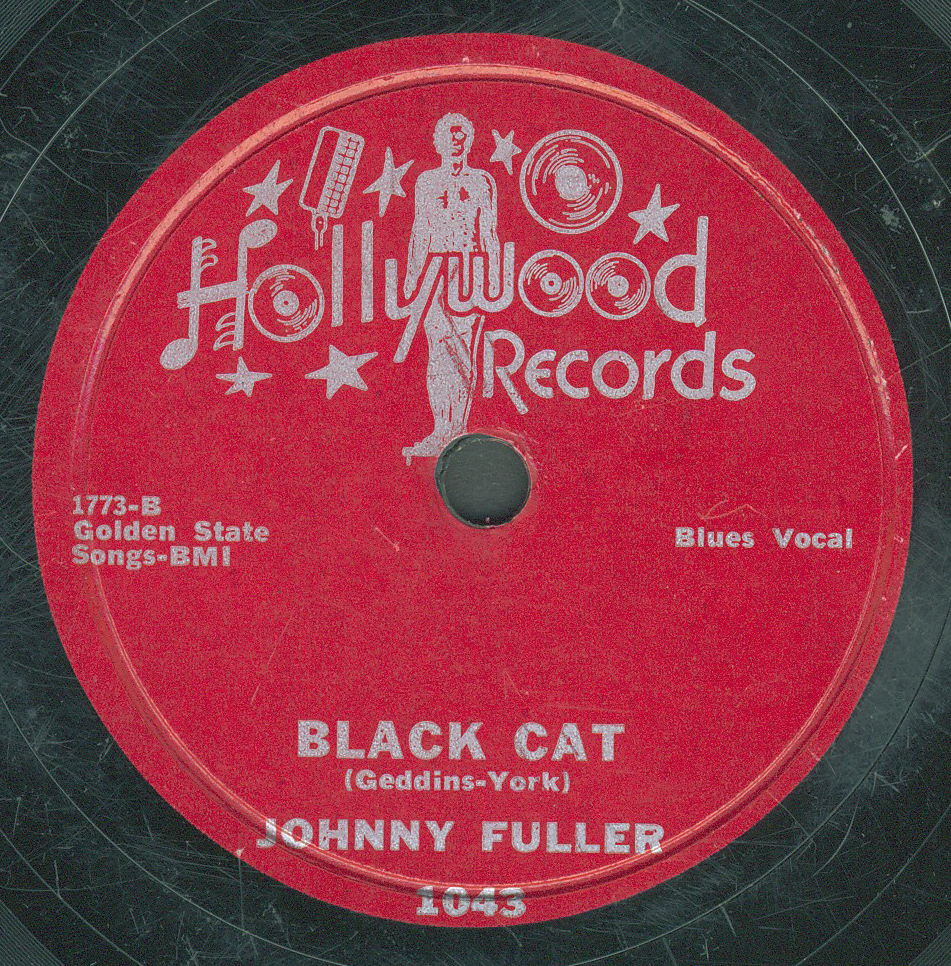 click here to listen |
Johnny Fuller recorded two solo sides for the short lived Jaxyson label in Oakland, 1948. He made his first recordings with a band in 1954 and continued to record into the 60's for various labels. Black Cat (Bad Luck Overtook Me) was recorded in San Francisco, 1954. The session includes George Hurst on piano and Walter Robinson on harmonica.
|
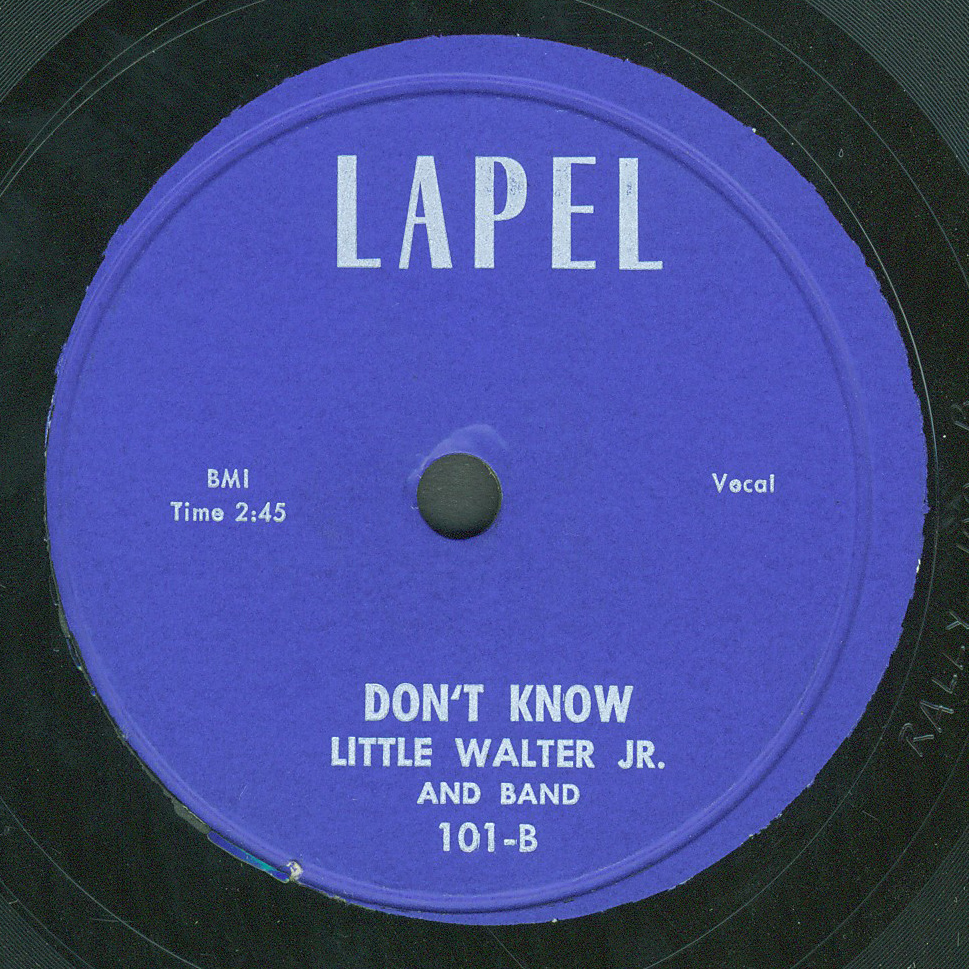 click here to listen |
George Smith was the undisputed King of the West Coast Blues Harmonica in the 1950's. He had the experience of playing with Muddy Waters and could match any of his Chicago contemporaries for tone and technique. George made his recording debut in Kansas City, 1955. These sides were issued as Little George Smith on Modern Records subsidiary label RPM. Don't Know was recorded for Lapel in Los Angeles,1956.
|
| SEND EMAIL | |
|
|
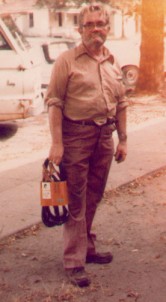 The Kernel |
A RIGHT TO THING THE BLUES POOR DUDLOW, the SYNCOPATED MONKEY, Oh! That Guy Again; however you say it, the Blues is his aim and Thingin' is his game. Poor Dud's early years are still a mystery; possibly born sometime in the late 1930ís, near Cle Elum. He is known to have been on the go during his teens and seems to have been on a seasonal commute from Roslyn, WA to Covington, LA for most of those years. It is uncertain how he acquired his piano skills or if he solely supported himself all that time as an entertainer but Dud was eventually recorded by Stick Horse (pronounced Schtick House) Spawldeen after many years of badgering by the Kernel (former carnie & battery cable distributor), who had already subsidizing his own income by pinching a good percentage off all D's gigs from Snoqualmie to Vantage. His only known 78 recording on the long defunct Stick Horse label out of Ellensburg appeared as Poor Dudlow at his piano performing "The Old Original Poor Dudlow Blues" & "Dud's Thing". Poor D's Blues never caught on seeming to have too much similarity to the already popular recordings of Myrtle Jenkins, Easton's blues queen. The flip, Dud's Thing, couldn't stay off local turntables and jukeboxes. Folks were ordering 'em by the box (25 copies). "Back in the 70's unopened boxes of Stick Horse 313 were still turning up from Blaine, WA to Highwood, MT" says the Mule (collector, researcher, juggist & Poor Dud scholar). Why D never really hit the bigtime and why the Kernel never marketed him as another Ken Griffin the world may never know. But what we do know is that by the early 60's Poor Dudlow was back in Louisiana with a very regional hit on 45. It was titled That Thing under his new pseudonym, The Syncopated Monkey for Stick Horse (pronounced Steek Whores) records in Ponchatoula. The Monkey continued with hit after hit; This Thing, That Thing, Those Things, Monkey Thing and upper Lake Ponchartrain was rockin'. It was like a dream to good to be true when from what seemed to be another lifetime came Poor D's long lost friend and confidant, the Kernel. He had Dud's music contract for life signed with an identifiably misspelled Pour Dudlo scribble and wanted his back rent. All D's thingin' around once again came to a halt and visibility once again faded for a very Poor Dudlow. Mr. D is thought to have contributed to soundtracks including Jumpin' with D. B. Cooper & Madam Atom's Private Jam Sessions and to be on countless NW bar band demos. His recent appearance on cylinders has brought about much discussion as there is never an address, phone or fax # in the advertisements. Raymond Barrow |
|
JUGS DISRUPT SUCK OFF The Sultan Suck Off was cut short by aggressive jug intervention, the ninth such incident since last year's Fandango Festival. This year's harmonica extravaganza featured its usual favorites: Harmonica Crabby, Jr. Mint, Middle Walter & Wedgwood Whitey all backed by the swaggering grooves of Queen Anne & Her Sloths of Rhythm. As in years past over a thousand, mostly yuppie bikers, come from as far as Index to be part of the event. It is estimated that some 900 are closet suckers themselves and over 375 are former students of Glacier Boy Dermody. Harmonica Crabby opened with a brilliant set but appeared a little pissed off. Jr. Mint was really suckin' until he was blown off stage by a confused Knobs Levell who thought he was at Woodstock '97. Harmonica Plaything's no show has become as much a part of the fest as the not so rare reappearance of Goldbar's own Middle Walter. A moody NW afternoon was starting to show it's effect and a field full of soaked suckers were beginning to show signs of unrest. Then it happened! Wedgwood Whitey was about to hit and no band. Not only no band, no equipment! Whitey was restrained, seven juggists took the stage & Cry Baby Marshall was forced to play an entire set in first position. Suckers went wild throwing dysfunctional diatonics & Canadian chromatics at the stage. The Babe's ability to sing Earl King tunes over abstract accompaniment and incorporate Big Chief into every solo kept the crowd under a blues hypnosis and prevented total disassembly of the stage. All seven juggists piled into a green '50 Hudson Commodore and drove off. Wedgwood Whitey held remaining suckers' interest with variations on Cat Hop until authorities arrived and broke up the event. Raymond Barrow |
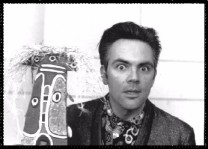 Cry Baby Marshall still in shock after Suck Off mishap |
Website Design by BoomKAK Productions